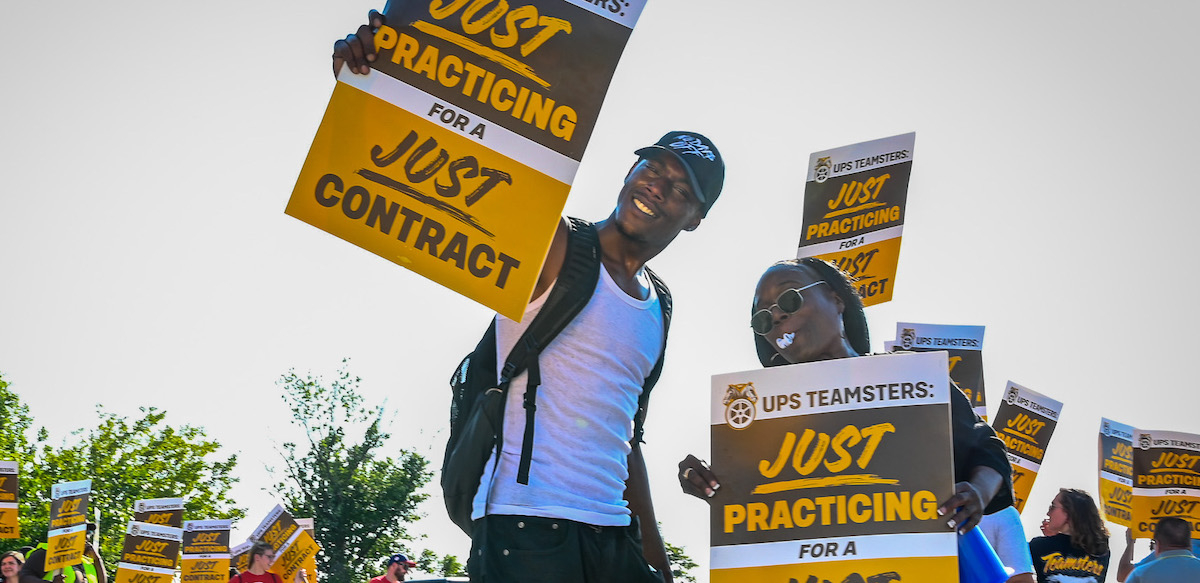Teamsters and Auto Workers Are Raising the Bar for Contract Campaigns

UPSers practiced picketing in Philadelphia July 13. Joe Piette, CC-BY-NC-SA 2.0.
With reformers at the helm, the Teamsters and the Auto Workers (UAW) are raising the bar for contract campaigns.
At Labor Notes we often hear from frustrated members of unions that have nothing like a contract campaign—members play no role in setting the agenda or building the momentum to win. Union leaders agree not to “bargain in the press,” squandering any chance to attract public sympathy. Sometimes the rank and file doesn’t even hear what’s going on until a deal is done.
Now that a better way is on display, I hope we can all file that approach “where it belongs,” in the trash—just like UAW President Shawn Fain filed automaker Stellantis’s opening proposal.
It was a stunt, but a delicious one, signaling that some union leaders are finally on the members’ side. Fain also bucked the tradition of opening bargaining by shaking the boss’s hand, and instead spent a day shaking hands with auto workers.
He and Teamsters President Sean O’Brien haven’t been shy about going after the employers publicly, shaking up bargaining timelines, and putting strikes on the table. That stuff not only ruffles company feathers but also stirs members’ spirits.
An organizer I knew used to say that members love to see a union leader “barking at the boss.” The point isn’t to fight on their behalf, but to help kickstart their own confidence.
BOTTOM-UP INITIATIVE
The more profound change is that these reformer-led unions are inviting members to play a meaningful role in building their own contract campaigns.
The Teamsters planned a year-long UPS campaign; Teamsters for a Democratic Union supplied help and tools. But the only ones who could make it real were the members themselves.
National contract campaigns shift the balance of power in a big way. Rank and filers who stepped up as organizers or took action now have new skills and confidence. You can’t put that toothpaste back in the tube.

SUPPORT LABOR NOTES
BECOME A MONTHLY DONOR
Give $10 a month or more and get our "Fight the Boss, Build the Union" T-shirt.
“It’s been life-changing for me personally,” said San Diego driver Abel De La Cruz, who helped organize what he and his co-workers called “Strike Force.” He turned from a shy guy into one who gives speeches, and his whole warehouse has a new camaraderie.
Fired up by the practice pickets, UPSers outside Boston backed off an abusive supervisor when they all turned their backs on him in a company meeting. The union’s next task will be to drive the momentum forward into contract enforcement with shop floor actions like this all over the country.
DEMAND A FIGHT
I can’t help being disappointed that there was no UPS strike, though, because it would have magnified this effect magnificently.
A strike hits not just at the bargaining table, but on the shop floor. During the 1997 UPS strike, tractor-trailer driver Dianne Bolton remembered, “You got to see your supervisor trying to do your job, which was very entertaining, to see them struggling so much, because they always thought they knew everything.”
And for the whole labor movement, a strike would have been a shot in the arm—an in-your-face demonstration of worker power. Every news channel would have covered the pickets, the union’s demands, and the panic of Wall Street and the White House.
Workers at Amazon, Walmart, and FedEx would have immediately taken note of what was won, and how. It would have set a great example for the Auto Workers, too.
Of course, that’s easy for me to say. Strikes come with real risks and lost wages, which workers and union leaders have to weigh against what could be gained.
The great strides made in the Teamsters and Auto Workers are moving the ball forward. All union members should take inspiration and demand a militant contract fight. Who’s next?





